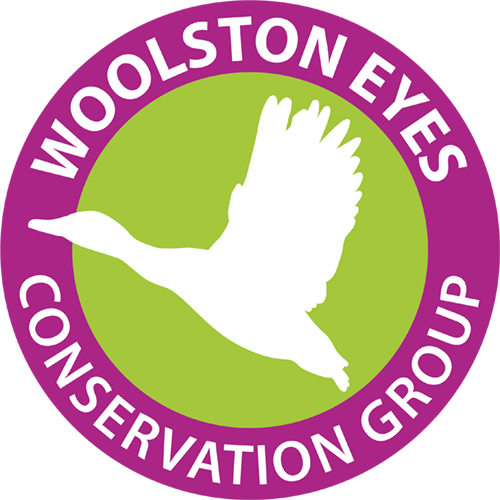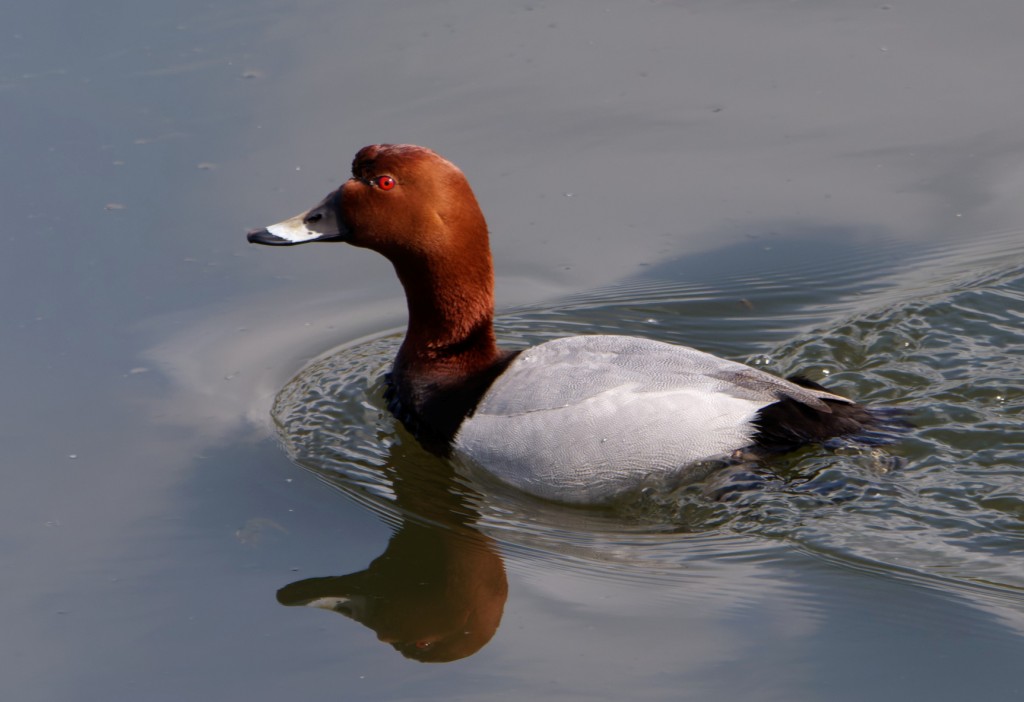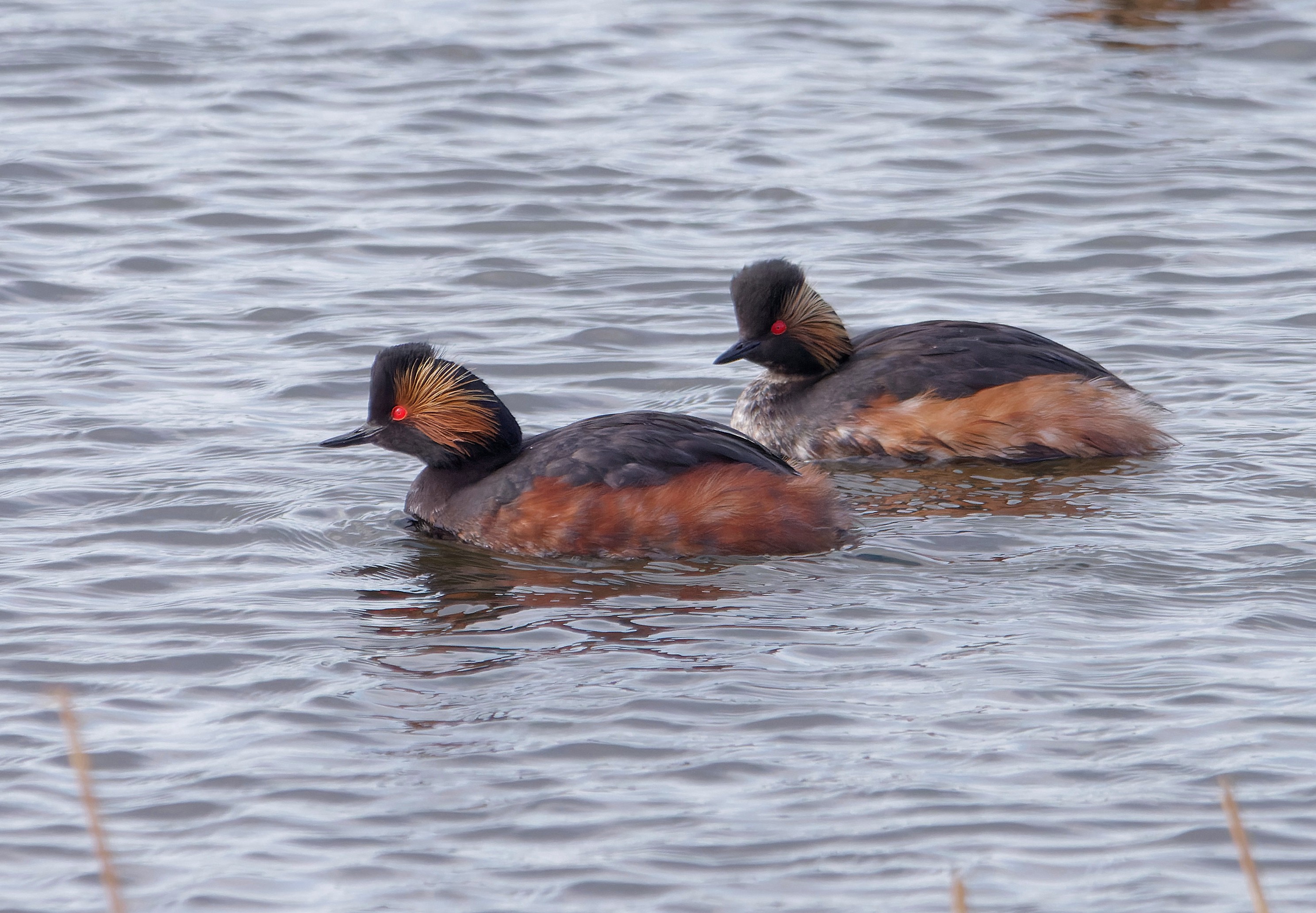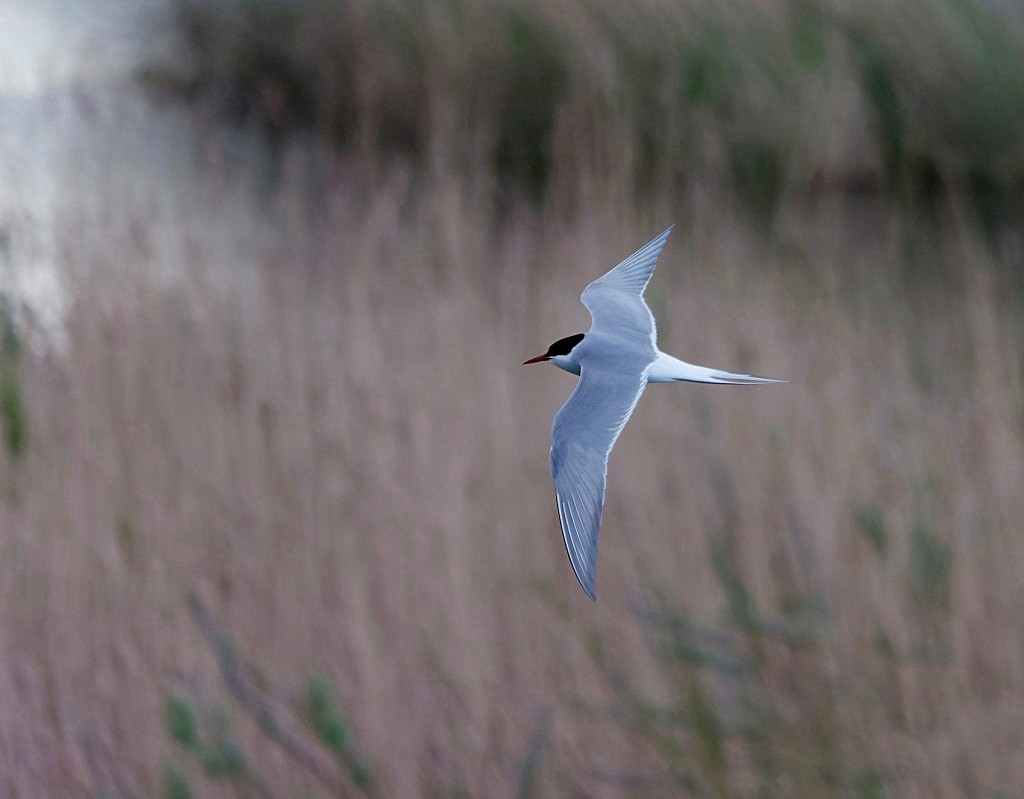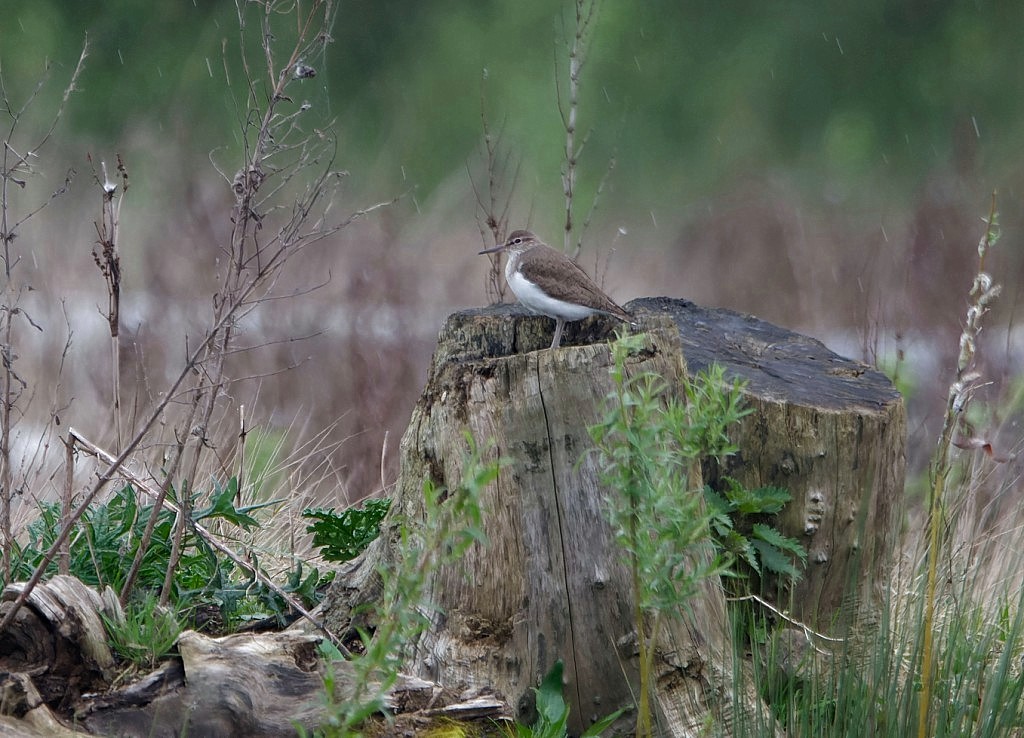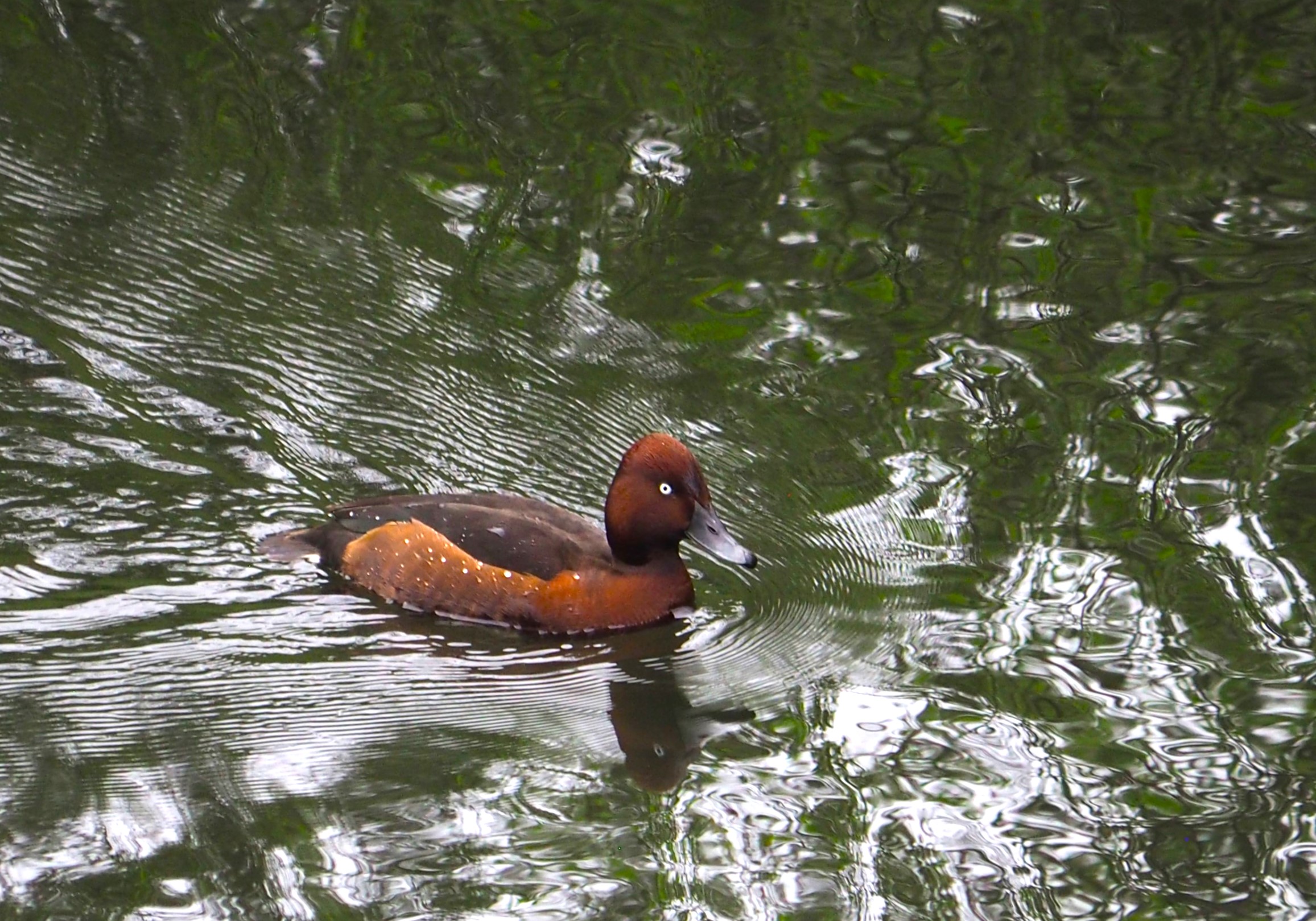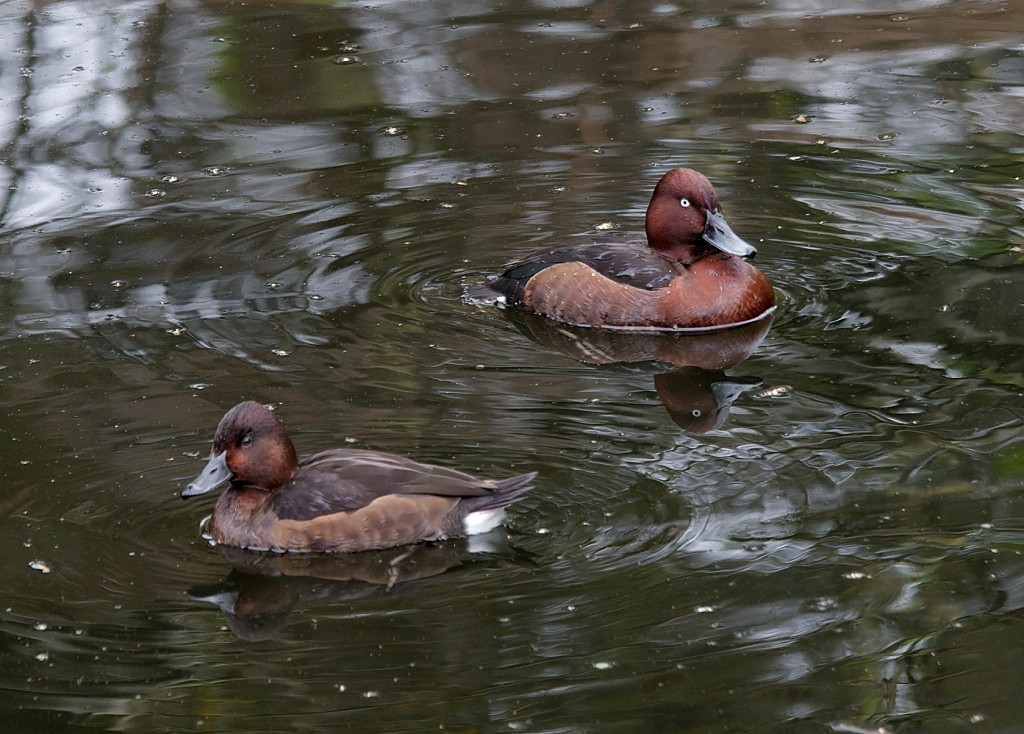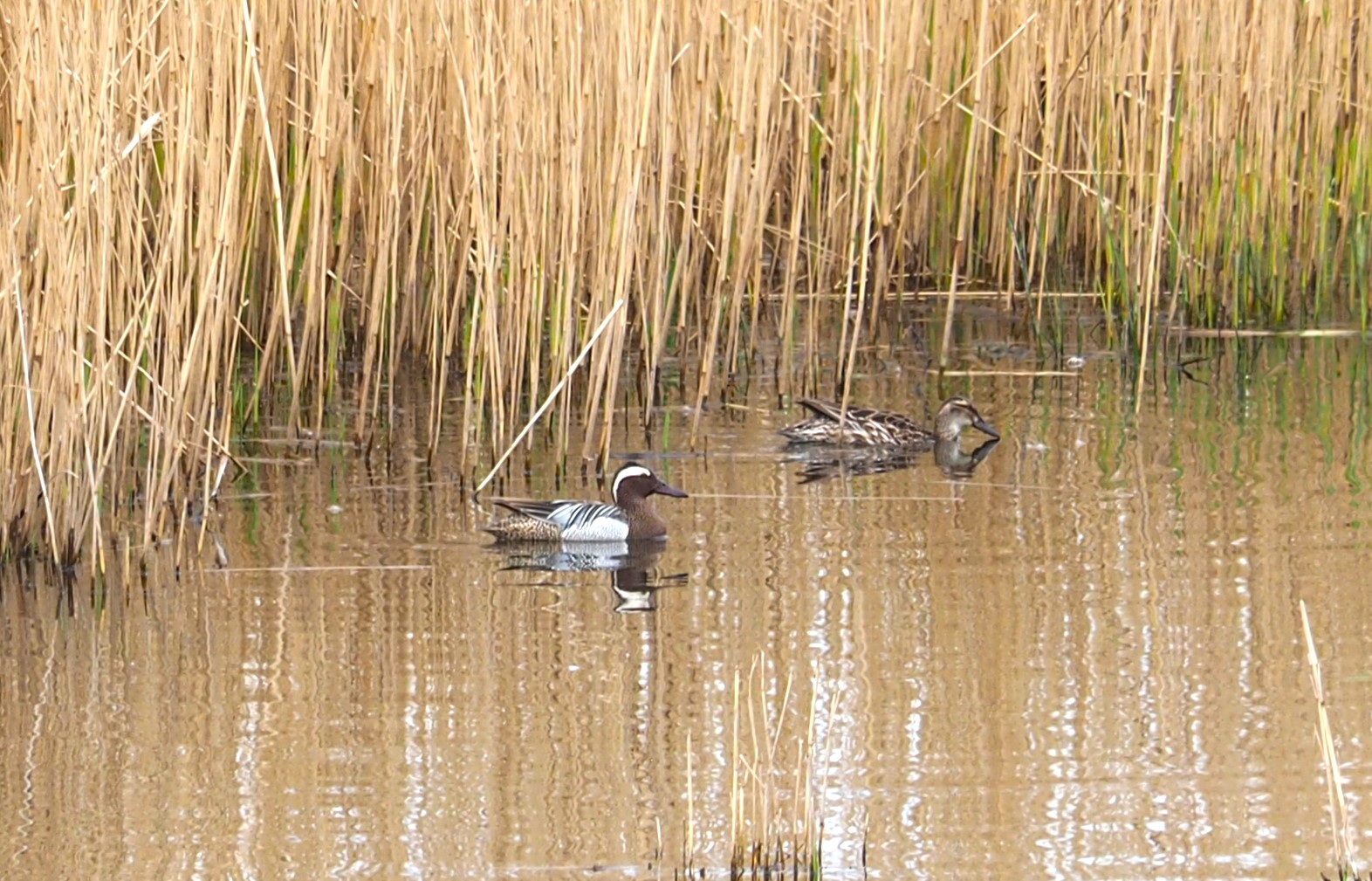Woolston Eyes Monthly Sightings
2024-04-30
A gusting southerly this morning, with largely blue skies, produced excellent conditions for migration. The morning’s highlight was a male Whinchat on No.4 bed, a declining species which is less than annual on the Reserve. In addition, we noted: 2 Yellow Wagtails, 2 Common Sandpipers, 1 Black-tailed Godwit, 1 Garden Warbler, 1 Lesser Whitethroat, 1 Grasshopper Warbler, 5 Sedge Warblers, 140 Swifts, 150 Sand Martins, 25 Swallows, 7 House Martins and 3 Mediterranean Gulls. Our breeding birds were also very much in evidence, including 28 Black-necked Grebes, a drake Garganey, scores of Pochard, several Marsh Harriers, plus 450 Black-headed Gulls, almost all of which have now settled on the No.4 bed wetland. As the morning warmed a few butterflies took flight on No.3 bed, with 2 Orange Tips, 2 Small Tortoiseshells and 9 Peacocks counted. Photo of a pair of Black-necked Grebes Cheers David Bowman (with Dan Owen)
Submitted by: David Bowman
2024-04-29
No.3 bed - 3 Marsh Harrier, 2 Great Spotted Woodpecker, Fox
Submitted by: John Blundell re info John Haddock
2024-04-28
No.4 bed - Greenshank and Garden Warbler
Submitted by: John Blundell re info Dan Owen
2024-04-28
It was nice to arrive, yesterday, to bright sunshine, with a light but cool easterly promising some good visible migration. We started on the No.4 bed viewing platform and were greeted by a passing Hobby, though the large Sand Martin roost on No.3 bed has now largely dispersed, so there were few hirundines around for it to target. A Little Egret then dropped onto one of the breeding islands before we were treated to an eye-level fly-past by a solitary Whimbrel. Hirundines and Swifts then started to trickle in from the west, with counts of 16 Swifts, 17 House Martins, 10 Swallows and 20 Sand Martins, before singles of Common Tern and Yellow Wagtail flew over. Then it was across to No.3 bed, where the highlights were a drake Garganey, two adult Mediterranean Gulls and a few more Swifts and hirundines. As ever, there were plenty of Black-necked Grebes around and at least a couple of Marsh Harriers, one of which, unfortunately, seems to have a damaged leg. Photo of a drake Pochard Cheers David Bowman (with Dan Owen, Helen Wynn and Brian Baird)
Submitted by: David Bowman
2024-04-26
No.4 bed - Garganey, Marsh harrier, 4+Swift
Submitted by: John Blundell re info David Mansfield
2024-04-25
No.3 bed - 30+ Swallow, 2 Mediterranean Gull
No.4 bed - Artic Tern & 22 Black-tailed Godwit through early am, 4 Mediterranean Gull , Common Sandpiper, 100+ Swallow
Submitted by: John Blundell re info Dan Owen
2024-04-24
No.1 bed - Hobby hawking then drifted west
No.3 bed - Garganey, 2 Oystercatcher, Tawny Owl, Badger, Marsh Harrier
No.4 bed - Whimbrel
Submitted by: John Blundell re info David Riley, Dan Owen & Dermot Smith
2024-04-23
After the excitements of a few days ago, with sightings of Little Bittern and Slavonian Grebe, it was back to more usual spring fare. Reports have included: Osprey, Avocet, Common Tern, Whimbrels, Greenshanks, Lesser Whitethroat and a steady trickle of Swifts. Altogether, its been our best spring ever, in terms of species variety and there are still a couple of weeks to go. Perhaps most interesting has been the establishment of a large Sand Martin roost on No.3 bed. This has formed every spring for the past few years, usually holding a thousand or so birds. This year, however, has been truly exceptional, with somewhere between 15-20,000 present, probably as a result of adverse winds holding up the migratory stream. When you consider that the whole UK breeding population is only about 100,000 pairs, the numbers currently present really are remarkable. Photo of a pair of Black-necked Grebes Cheers David Bowman (with Dan Owen)
Submitted by: David Bowman
2024-04-22
Common Tern on Ship Canal, Avocet on field south of Butchersfield
No.4 bed - 27 Black-tailed Godwit, single Swift over, Yellow Wagtail, 3 Redshank. Lesser Whitethroat, 2 Whimbrel over towards No.3 bed, Common Sandpiper
Submitted by: John Blundell per info David Spencer & Dan Owen
2024-04-21
No.3 bed - Greenshank flew over 10:25ish
Submitted by: John Blundell re info David Spencer
2024-04-20
No.3 bed - Ringed-necked Parakeet in trees by south meadow
Submitted by: John Blundell re info per Kieran Foster
2024-04-20
We think we saw an Osprey fly over this morning, about 8.30, heading west along the ship canal, then veered across towards the Eyes around the junction of Thelwall New Rd and Richmond Ave. can anyone confirm this?
Submitted by: Nick & Linda Thomson
2024-04-19
No.4 bed - Artic Tern
Inaccessible area - Little Bittern, Slavonian Grebe
Submitted by: John Blundell re info Brian Martin, David Spencer & Kieran Foster
2024-04-18
No.4 bed - 2 Mediterranean Gull, 2 Sedge Warbler, 3 Little Egret (flew south east)
No.1 bed - 4 Gannet reported flying over south
Inaccessible area - Slavonian Grebe
Submitted by: John Blundell re info Dan Owen & David Spencer
2024-04-16
Strong northerly winds and heavy overnight rain had eased by dawn, though it was still too gusty to undertake the survey of birds in song which we had planned. Conditions, though, looked good for observing visible migration, with migrants likely to be brought down by the adverse winds. The viewing platform on the No.4 bed wetland provides a 360 degree vantage point and we were treated to an excellent first hour’s birding. It started with a Common Sandpiper skimming across the water to pitch onto one of the islands. Then Arctic Terns started arriving, with five in total stopping to feed before all but two drifted off. Whereas Common Terns breed in good numbers in the north-west and are thus pretty regular on the Reserve, Arctic Terns are less common inland and so always good to see. A single Yellow Wagtail then flew over and a Little Gull nearly slipped past us, disappearing in the direction of No.3 bed. Best was for last, though, as a single Common Swift appeared overhead - our earliest ever, by a day. Then it was over to No.3 bed as the day warmed, where the highlights were: 2 Mediterranean Gulls and 2 Grasshopper Warblers, while the sun brought out a few butterflies and insects, with 1 male Orange Tip, 3 Peacocks and 1 Dark-edged Bee-fly the pick of the bunch. Record shot of one of the Arctic Terns Cheers David Bowman (with Dan Owen)
Submitted by: David Bowman
2024-04-13
The southerly winds brought a significant arrival of migrants this morning and, though the day never really warmed up, the scattering of Cowslips and Primroses emphasised that spring is well underway. We covered three of the four beds and produced an impressive species list for so early in the year. Highlights included: 1 Common Sandpiper, 1 Yellow Wagtail, 4 White Wagtails, 2 Garganey, 4 Grasshopper Warblers, 12 Whitethroats, 20 Reed Warblers, 123 Chiffchaffs, 45 Willow Warblers, 93 Blackcaps, 25 Cetti’s Warblers, 2 Mediterranean Gulls, 2 Green Sandpipers, 4 Little Ringed Plovers, 7 Ringed Plovers, 5 Dunlin, 8 Oystercatchers, 26 Black-necked Grebes, 4 House Martins, 30 Swallows, 250 Sand Martins and 2 Marsh Harriers. Now, all we need is some warm, dry weather! Photo of the Common Sandpiper Cheers David Bowman (with Dan Owen and Helen Wynn)
Submitted by: David Bowman
2024-04-12
No.3 bed - 6 or 7 Black-necked Grebe, Greylag Goose brood of 5 young, 2 Oystercatchers, only 28 Black-headed Gulls, 50+ Pochard, Ferruginous Duck
Submitted by: John Blundell re info Brian Martin
2024-04-11
A little shy at first but our ferruginous duck emerged from the undergrowth to work his way down the catwalk to the bridge for a photo shoot before taking his place again behind the tufted ducks. No sign of the female though
Submitted by: Gilbert Wieringa
2024-04-09
No.3 bed - 2 Garganey
No.4 bed - 2 Pintail, 10 Swallow, 250 Sand Martin
Submitted by: John Blundell re info David Spencer & David Bowman
2024-04-08
No.3 bed - 4 Curlew, 2 Black-tailed Godwit, Reed Warbler influx, Ferruginous Duck, Willow Tit, 2 Garganey, c 700 Sand Martin
Submitted by: John Blundell re info Dan Owen, Keith, Ian Howarth & Dermot Smith
2024-04-07
No.3 bed - Ferruginous Duck, Water Rail, 2 Oyster Catcher, 2 Shelduck, 2 Marsh Harrier, 2 Sparrowhawk, 60 Sand Martin, 4 Buzzard, Kestrel,
Submitted by: John Blundell re info Les Jones & Dan Owen
2024-04-06
It was a warm, breezy morning, ideal for conducting the monthly Wetland Birds Survey (WeBS). With wardens covering all four beds and a strengthening southerly wind, there was always a chance that something unusual would turn up. An overnight roost on No.3 bed held at least 1,000 Sand Martins, something which is becoming a regular spring feature on the Reserve. As well as some excellent counts of our regular breeding wildfowl, the rare/scarce wildfowl which we knew were present also put in appearances. The pair of Ferruginous Ducks continued to show well from the No.3 bed Footbridge, while the pair of Garganey were a bit more distant than recently, when viewed from the South Screen. Not to be left out the female Lesser Scaup was also located, on the Ship Canal near Bollin Point. A couple of Swallows, a few Willow Warblers, a Little Ringed Plover and a Curlew were other nice sightings. The excitement and frustration, though, came when I’d just finished my counts from the Morgan Hide. I heard an agitated Water Rail making a racket from a small patch of phragmites reed in front of the hide. A moment later it chased a very small crake out of the reeds, which fluttered onto the edge of the scrape, where it was then out of sight and, despite our best efforts, was not seen again. Based on the very brief view I was pretty sure it was one of the Eastern European-breeding migratory crakes, either Little or Baillon’s but, unless its seen/heard again it’ll have to be one that got away. Photo of the Ferruginous Ducks Cheers David Bowman (with Dan Owen, David Spencer, Brian Martin and Dave Hackett)
Submitted by: David Bowman
2024-04-06
No.3 bed - Ferruginous Duck below footbridge, 2 Garganey south screen, Water Rail, no Black-necked Grebe seen, all on No.4 bed?
No.4 bed - 19+ Black-necked Grebe, 2 Mediterranean Gull, 2 Barnacle Goose, Little Ringed Plover & Curlew
Ship Canal - Lesser Scaup below Lymm Golf Club
WeBS count totals: 104 Canada Goose, 2 Barnacle Goose, 57 Greylag Goose, 49 Mute Swan, 12 Shelduck, 3 Mandarin, 4 Garganey, 24 Shoveler, 235 Gadwall, 86 Mallard, 30 Teal, 125 Pochard, 2 Ferruginous Duck, 306 Tufted Duck, Lesser Scaup, Ruddy Duck, 8 Water Rail, 16 Moorhen, 103 Coot, 33 Little Grebe, 22 Great Crested Grebe, 19 Black-necked Grebe, 18 Oystercatcher, 4 Lapwing, 2 Ringed Plover, 5 Little Ringed Plover, 2 Curlew, Snipe, Green Sandpiper, 213 Black-headed Gull, 2 Mediterranean Gull, Common Gull, 3 Great Black-backed Gull, 11 Herring Gull, 43 Lesser Black-backed Gull, 3 Grey Heron, 3 Cormorant, Kingfisher
Submitted by: John Blundell re info Dan Owen, David Bowman, David Spencer, David Hackett & Brian Martin
2024-04-05
Garganey pair from the reed bed opposite the screen, 4th April 2024, 15:00
Submitted by: Gilbert Wieringa
2024-04-05
Canal - Orange Tip by Latchford Locks & Brimstone on Canal Track
No.3 bed - 2 Orange Tip on south bank
Submitted by: John Blundell re info David Hackett
2024-04-04
Canal - Lesser Scaup on Ship Canal with Tufted alongside Butchersfield, could view from footpath on Lymm side of canal. Also Drake Common Scoter on flood south of Butchersfield
No.3 bed - Garganey pair from South Screen
Submitted by: John Blundell re info Dan Owen and David Spencer
2024-04-03
No.3 bed - 2 Garganey, 2 Ferruginous Duck below footbridge, House Martin
No.4 bed - 2 Barnacle Goose, 2 Little Egret
Submitted by: John Blundell re info Dan Owen and Michael Miles
2024-04-02
No.3 bed - Drake Garganey
No.4 bed - 4 Black-necked Grebe, Marsh harrier, 2 Kingfisher,
Submitted by: John Blundell re info Nick French and Dave Hackett
2024-04-01
No.3 bed - Pair Garganey, Great Egret, 2 Marsh Harrier, 1000+ Sand martin
No.4 bed - Wheatear,
Submitted by: John Blundell re info David Spencer, Dan Owen and Kieran Foster
2024-04-01
March Butterflies. In spite of the unsuitable weather throughout the month, some butterflies were reported, including our earliest ever Speckled Wood on 6th March. Four other species were seen, namely Small Tortoiseshell, Peacock, Comma and Brimstone.
Submitted by: Dave Hackett
